Publications
-

Exploring Information Needs for Tracking to Support Using Wheelchairs in Everyday Life
Wen Mo, Aneesha Singh, Catherine HollowayJuly 9, 2024GlobalAcademic Research PublicationsThis study contributes by delineating the unmet information needs in wheelchair tracking and advocating for more research interests to develop and design tracking tools in Human-Computer Interactions (HCI) that enrich the everyday experiences of wheelchair users.
-
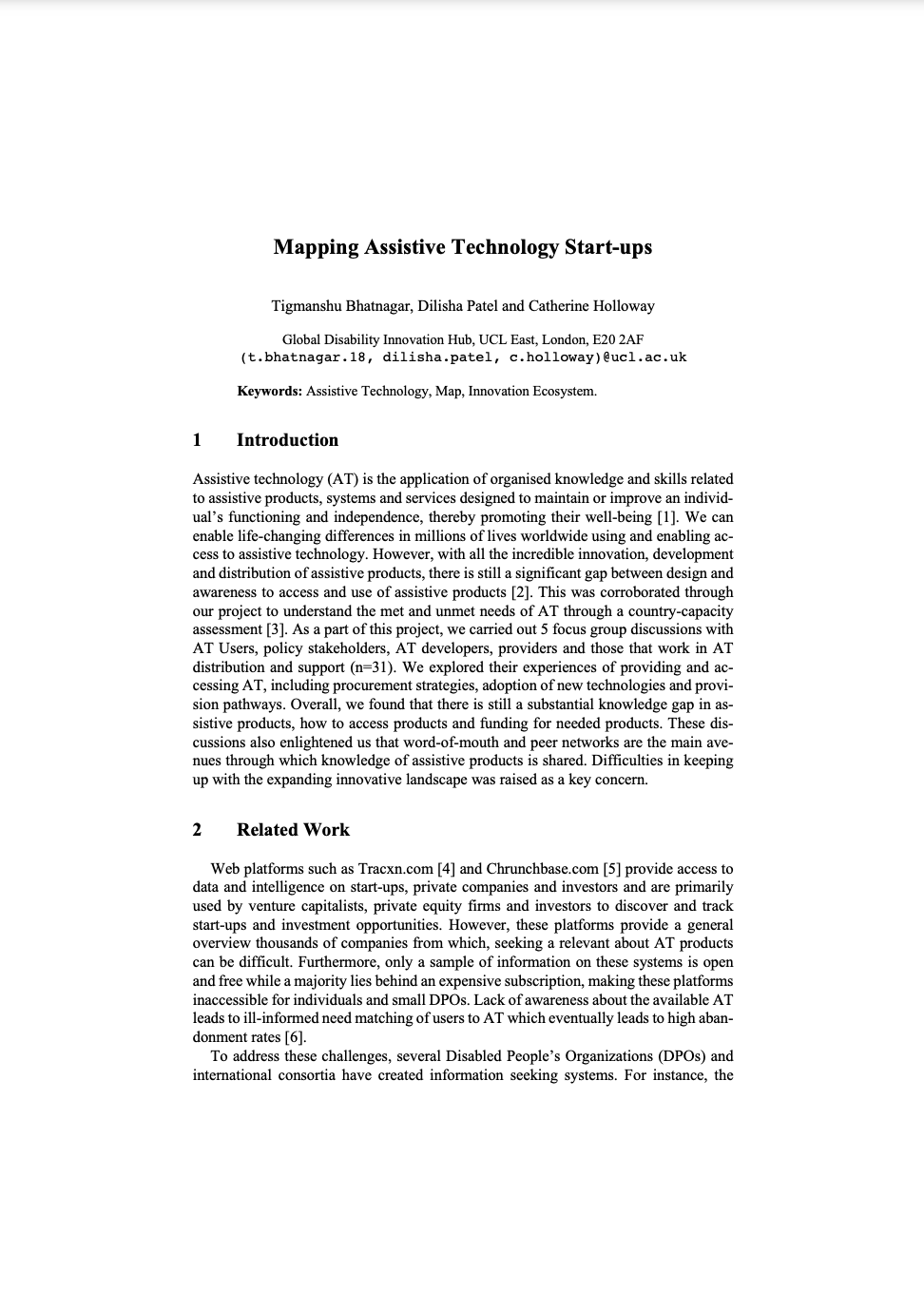
Mapping Assistive Technology Start-Ups (book: Design for Equality and Justice)
Catherine Holloway, Tigmanshu Bhatnagar, Dilisha PatelJuly 9, 2024AT2030 ResourcesThis project aimed to assess the met and unmet needs of AT through five focus group discussions with users, policy makers, developers, and providers. Findings revealed a major knowledge gap in accessing and funding assistive products, with word-of-mouth and peer networks being the primary sources of information.
-
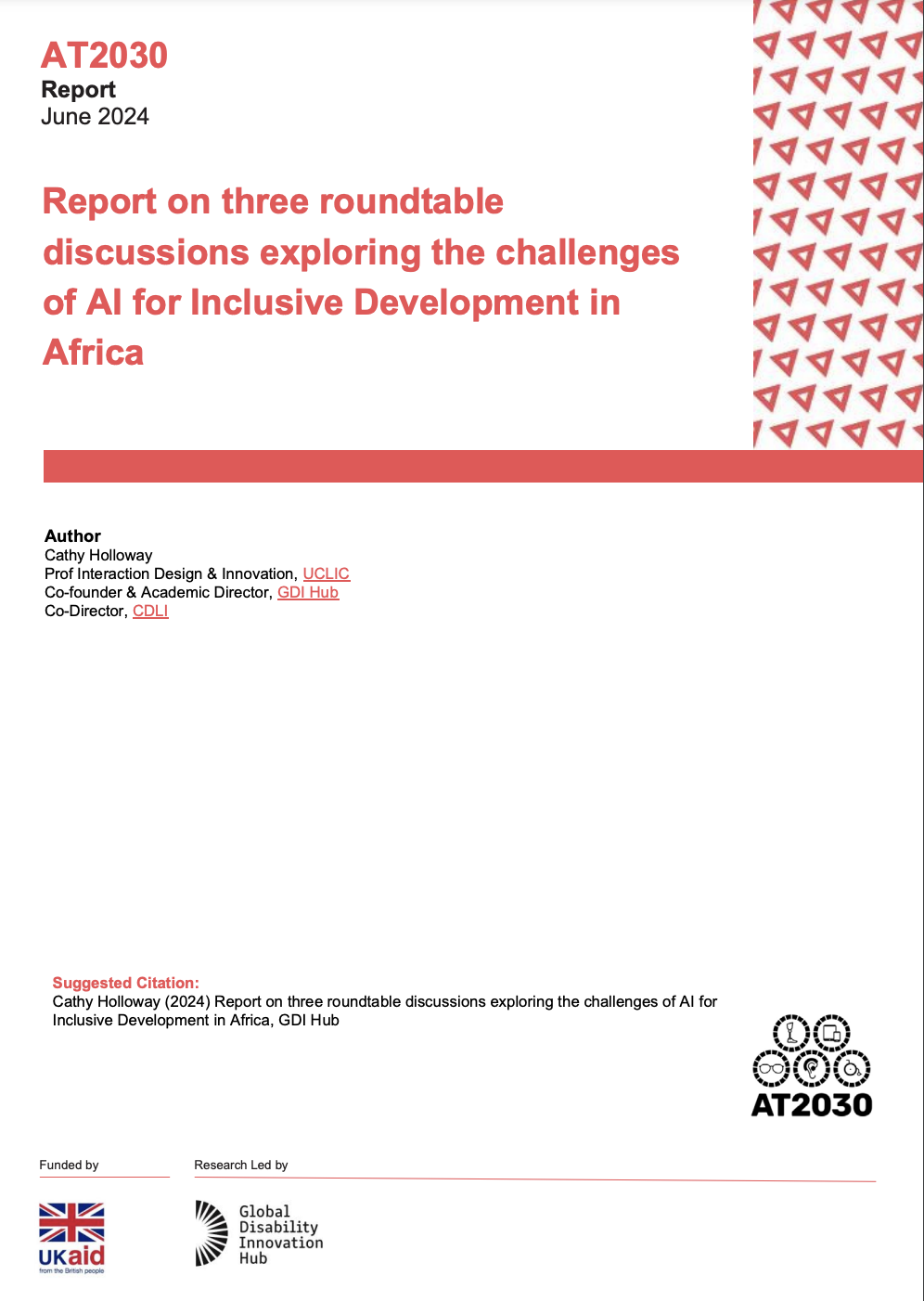
AI for Disability Inclusion in Africa
Global Disability Innovation HubJune 30, 2024AfricaAcademic Research PublicationsThis report summarises the opportunities, challenges and enablers for disability-inclusive AI in Africa and key research questions that were identified in three online roundtables held in February, March and April 2024. The roundtables were convened and hosted by UCL’s Global Disability Innovation Hub (GDI Hub) at the request of the Foreign, Commonwealth and Development Office (FCDO).
-
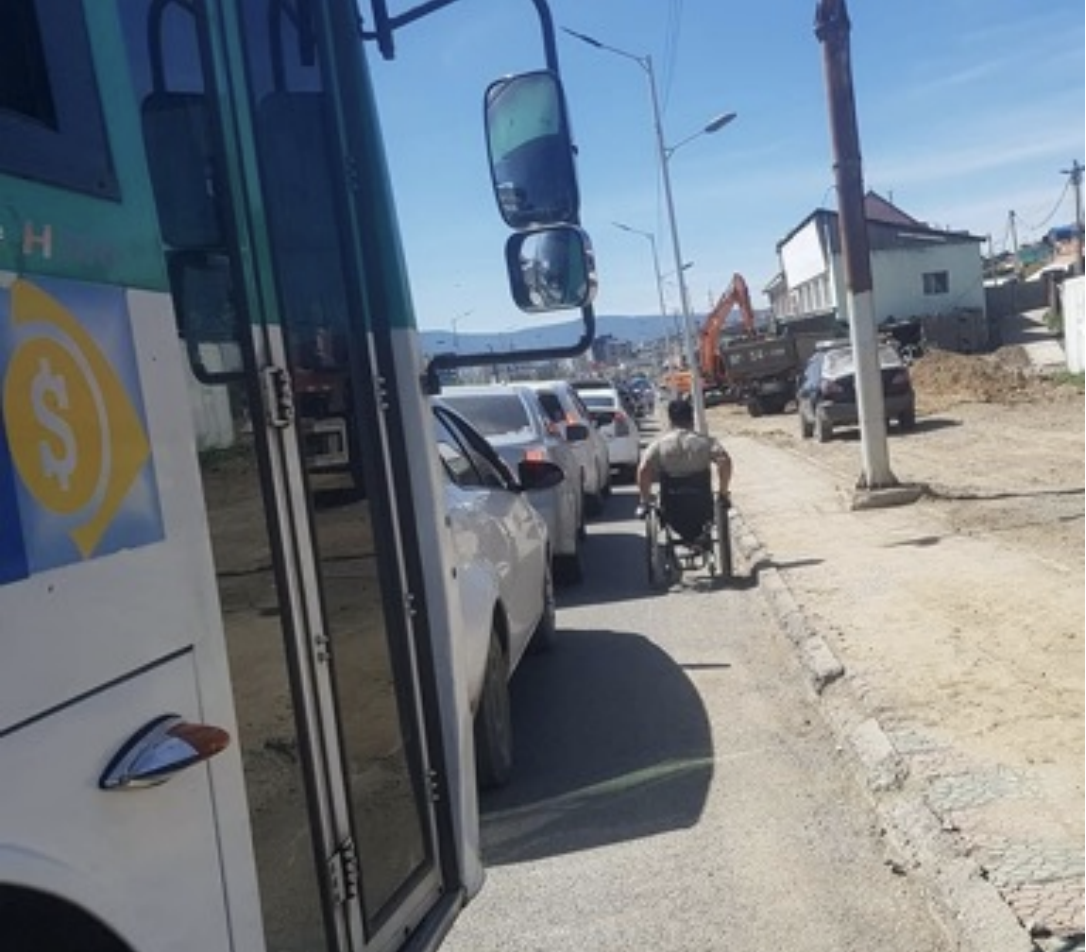
Collection of the AT2030 Inclusive Infrastructure case studies on Accessibility and Inclusive in the Built Environment.
Global Disability Innovation HubJune 13, 2024GlobalCase Studies and ReportsA collection of the case studies from the Inclusive Design and Accessibility of the Built Environment research.
-
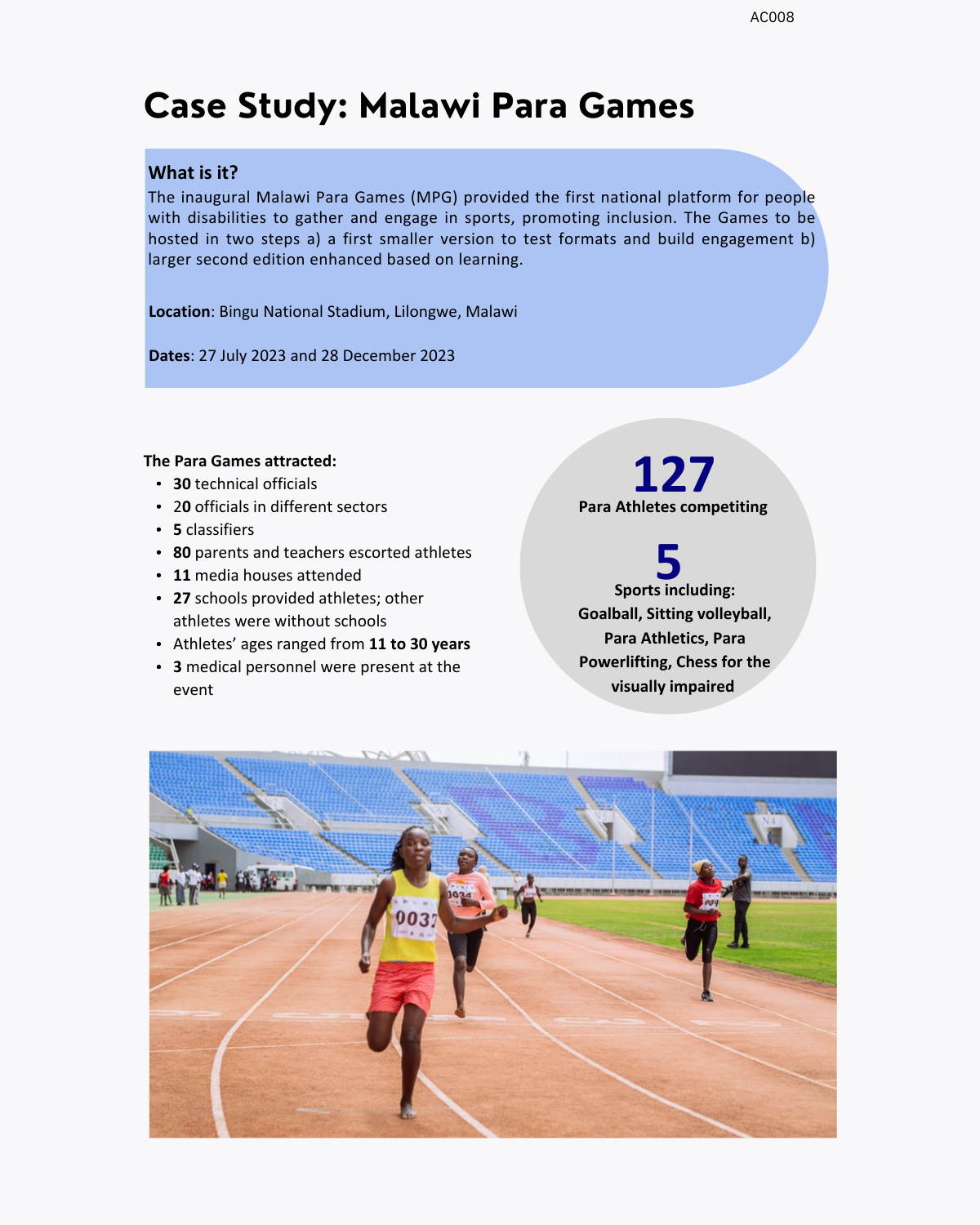
Case Study: Malawi Para Games
Global Disability Innovation HubMay 19, 2024MalawiCase Studies and ReportsThe Inaugural Malawi Para Games (MPG) provided the first national platform for people with disability to gather and engage in sports, promoting inclusion.
-
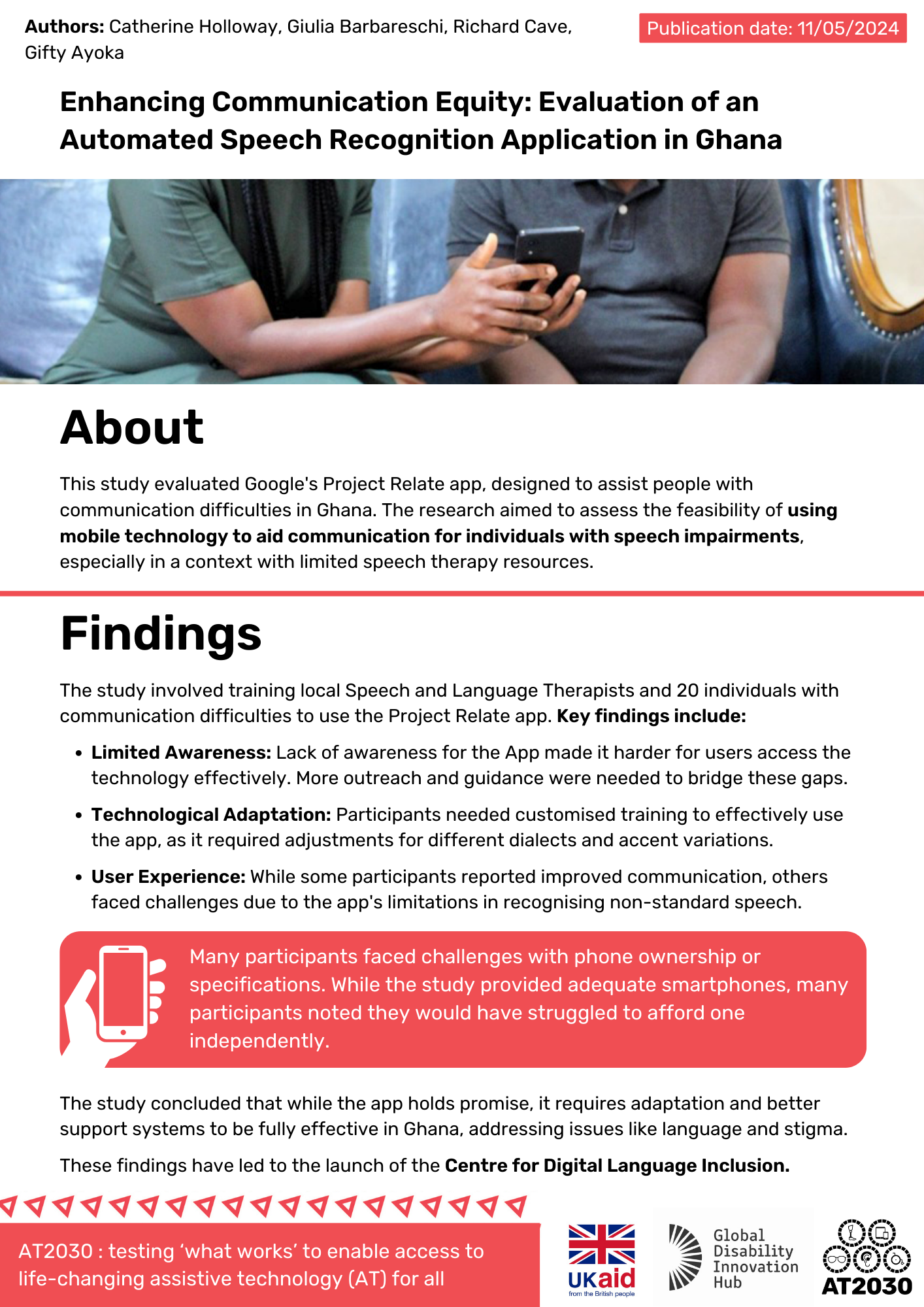
Enhancing Communication Equity: Evaluation of an Automated Speech Recognition Application in Ghana - Research Summary
Catherine Holloway, Giulia Barbareschi, Richard Cave, Gifty AyokaMay 11, 2024Research SummariesThis study assessed Google's Project Relate app in Ghana to assist individuals with speech impairments. Key findings included challenges with device access, the need for customised training, and limited awareness of the app. While some users benefited, others faced issues with speech recognition. The study highlighted the need for better support and adaptations, leading to the launch of the Centre for Digital Language Inclusion to address these challenges.
-
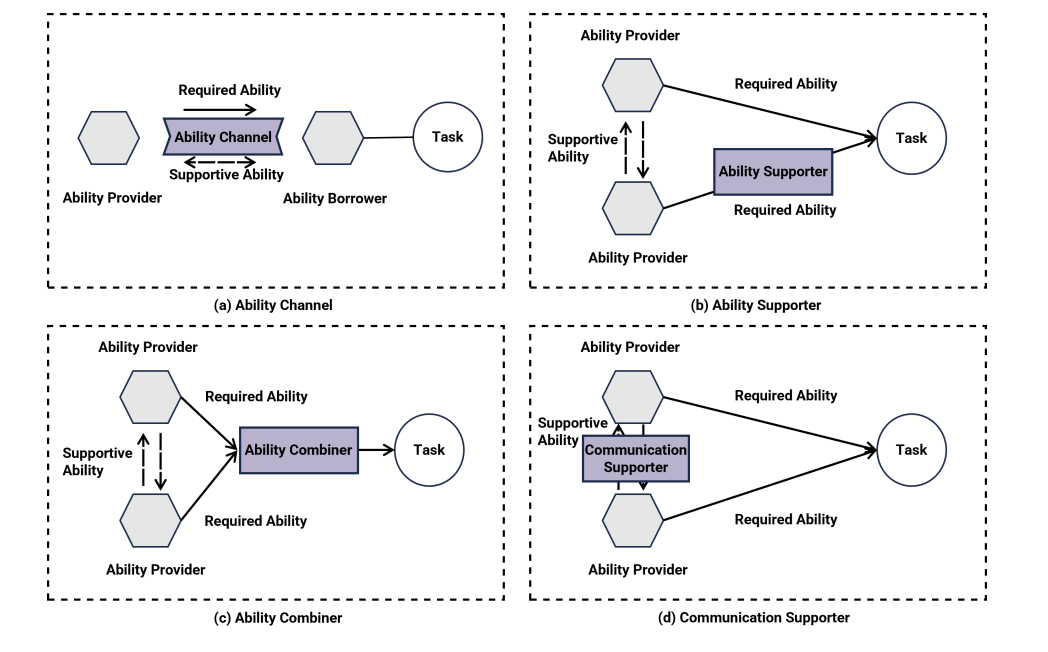
A Systematic Review of Ability-diverse Collaboration through Ability-based Lens in HCI
Catherine Holloway, Tigmanshu Bhatnagar, Maryam Bandukda, Lan Xiao, Katrin Angerbauer, Weiyue Lin, Michael SedlmairMay 11, 2024GlobalAcademic Research PublicationsThis paper offers an analysis of 117 papers sourced from the ACM Digital Library spanning the last two decades. It contributes (1) a unified taxonomy and the Ability-Diverse Collaboration Framework, (2) a reflective discussion and mapping of the current design space, and (3) future research opportunities and challenges. Finally, we have released our data and analysis tool to encourage the HCI research community to contribute to this ongoing effort.
-

Enhancing Communication Equity: Evaluation of an Automated Speech Recognition Application in Ghana
Catherine Holloway, Giulia Barbareschi, Richard Cave, Gifty AyokaMay 11, 2024GhanaAcademic Research PublicationsIn Ghana people who struggle to articulate speech as a result of different conditions experience barriers in interacting with others due to difficulties in being understood. Automatic speech recognition software can be used to help listeners understand people with communication difficulties. However, studies have not looked at the practical feasibility of these technologies beyond the Global North. We present a novel user study examining the introduction of one such technology, Google Project Relate, to Ghana.
-
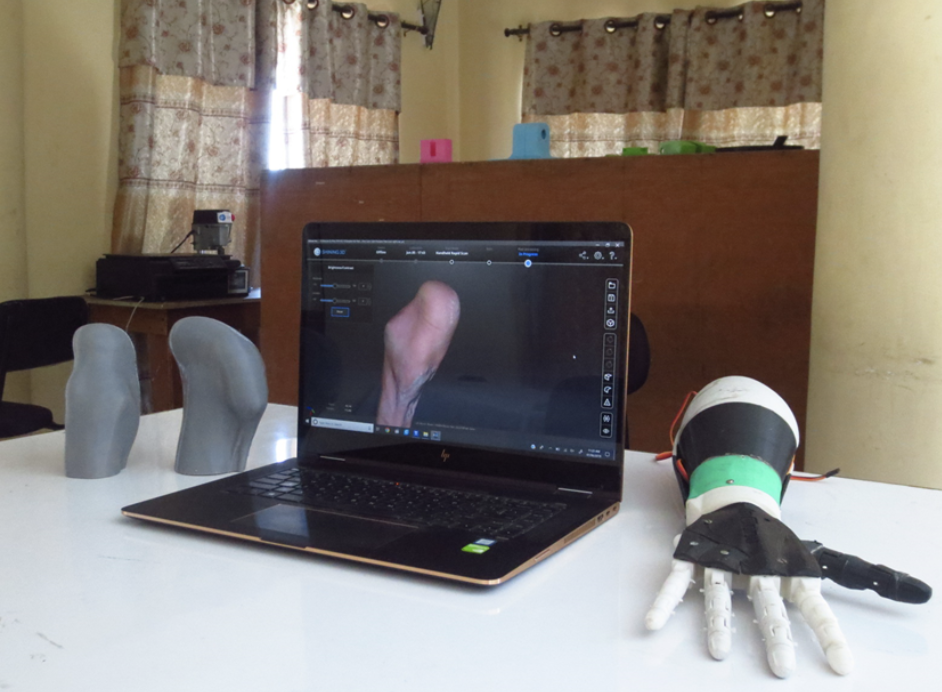
NEPCON Conference 2024
Dr Ben Oldfrey, RAM CHANDRA THAPAMay 10, 2024NepalAcademic Research PublicationsA presentation made at the 2nd NEPOCON (Nepal Prosthetics and Orthotics) conference in May 2024 by five members of the project team led by Ram Chandra Thapa from Zener Technologies in Nepal, and Ben Oldfrey from UCL, on A Global-Local Innovation Approach for Appropriate Technology in LMICs: A Case Study in Nepal.
-
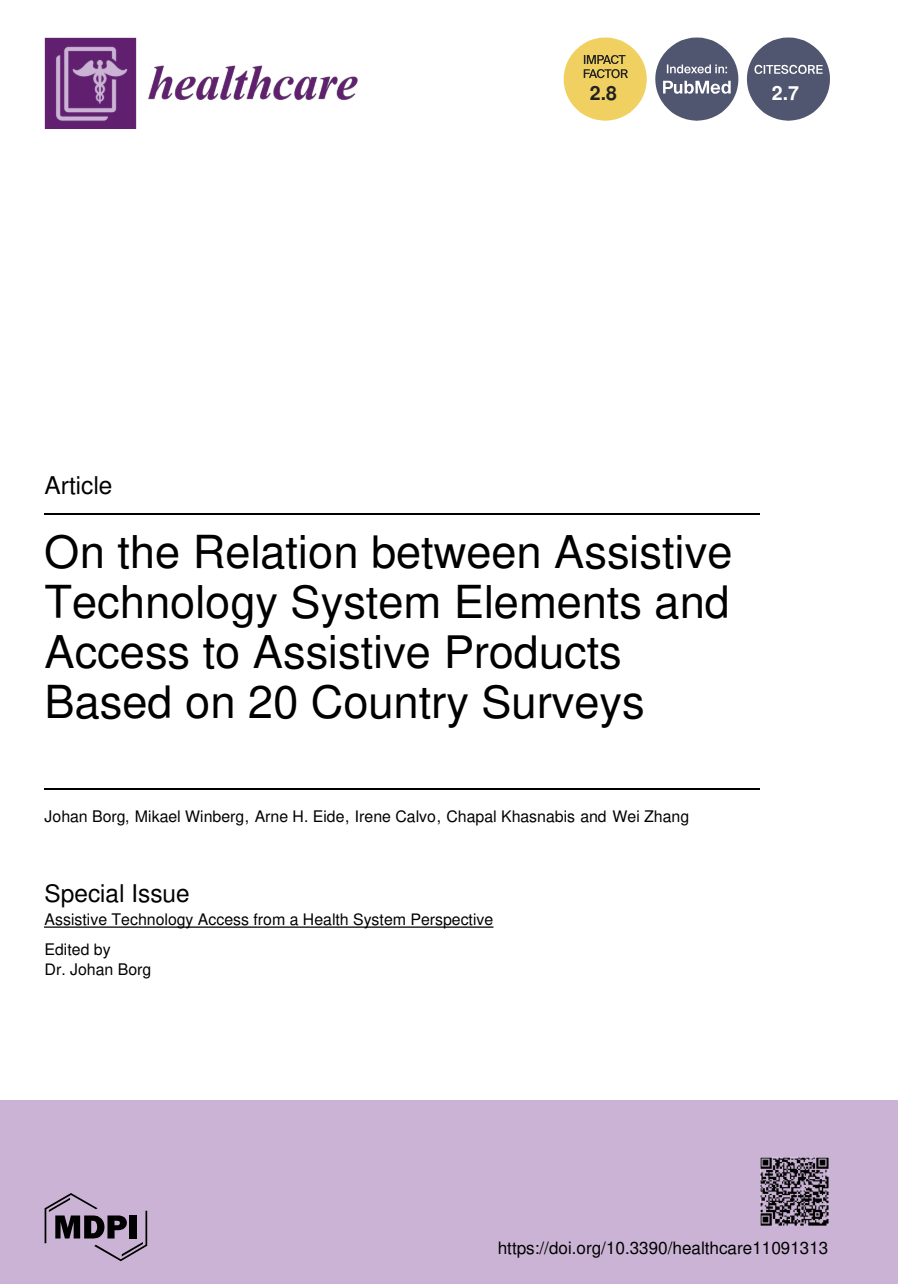
On the Relation between Assistive Technology System Elements and Access to Assistive Products Based on 20 Country Surveys
Wei Zhang, Johan Borg, Irene Calvo, Chapal Khasnapis, Mikael Winberg, Arne H EideMay 3, 2024GLobalAcademic Research PublicationsThe objective of this study was to explore the relationship between assistive technology system elements and access to assistive products. Data on assistive technology system elements and self-reported survey data on access to assistive products from 20 countries were analyzed using multivariate statistical methods, including orthogonal partial least squares analyses.
-
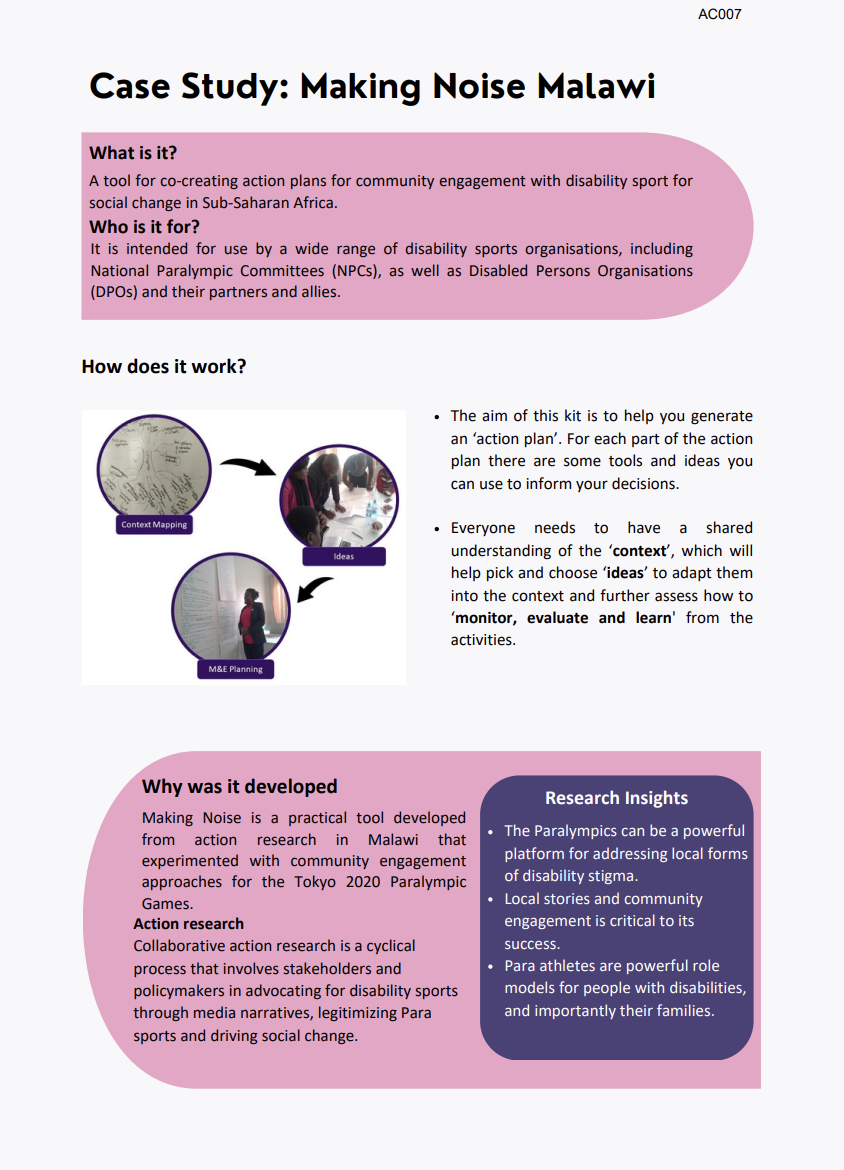
Case Study: Making Noise Malawi
University of MalawiApril 19, 2024MalawiCase Studies and ReportsThis is a tool for co-creating action plans for community engagement with disability sport social change in Sub-Saharan Africa. It is intended for use by a wide range of disability sports organisations, including National Paralympic Committees (NPCs), as well as Disabled Persons. Organisations (DPOs) and their partners and allies.
-
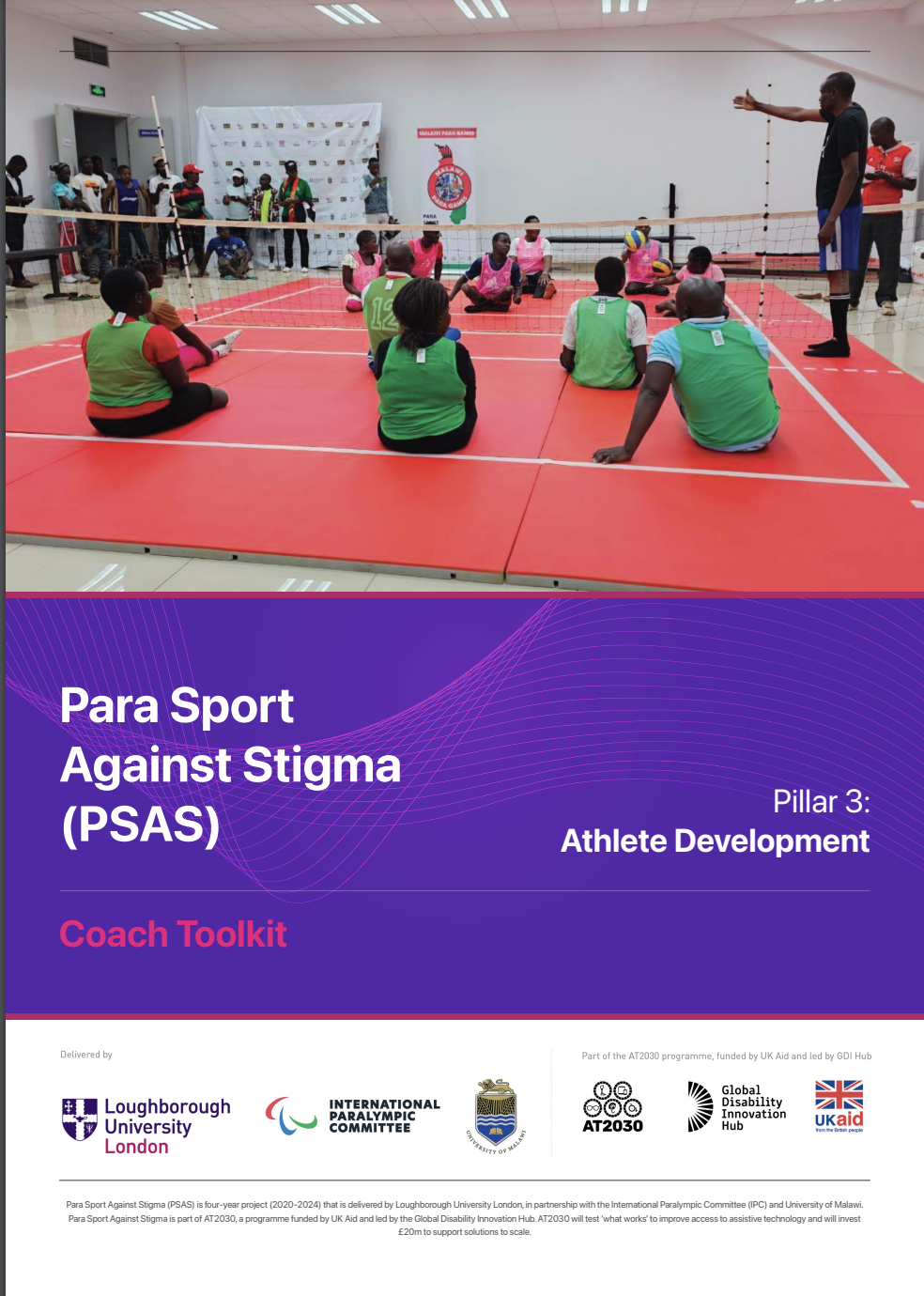
Para Sport against stigma coach toolkit
Loughborough University, The International Paralympic Committee (IPC), University of MalawiApril 19, 2024MalawiAT2030 ResourcesThis toolkit is aimed at supporting coaches who work with disability athletes within their national and international sporting systems. This includes coaches who are starting out within the parasport system, and also those who currently have athletes on national training programmes supported by the National Paralympic Committee (NPC) and competing under their international federation (IF) rules for a particular sport.
-
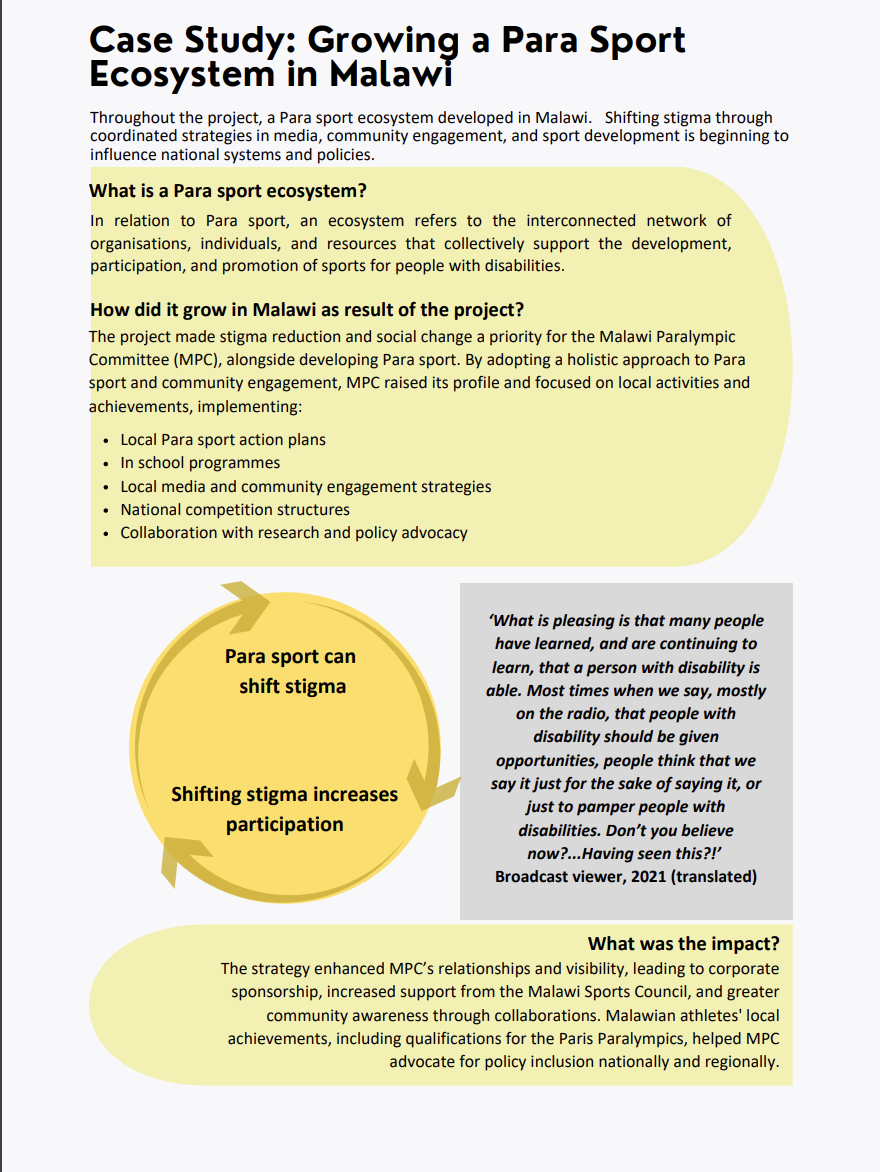
Case study : Growing a Para Sport Ecosystem in Malawi
University of MalawiApril 18, 2024MalawiCase Studies and ReportsThroughout the project, a Para sport ecosystem developed in Malawi. Shifting stigma through coordinated strategies in media, community engagement, and sport development is beginning to influence national systems and policies.
-
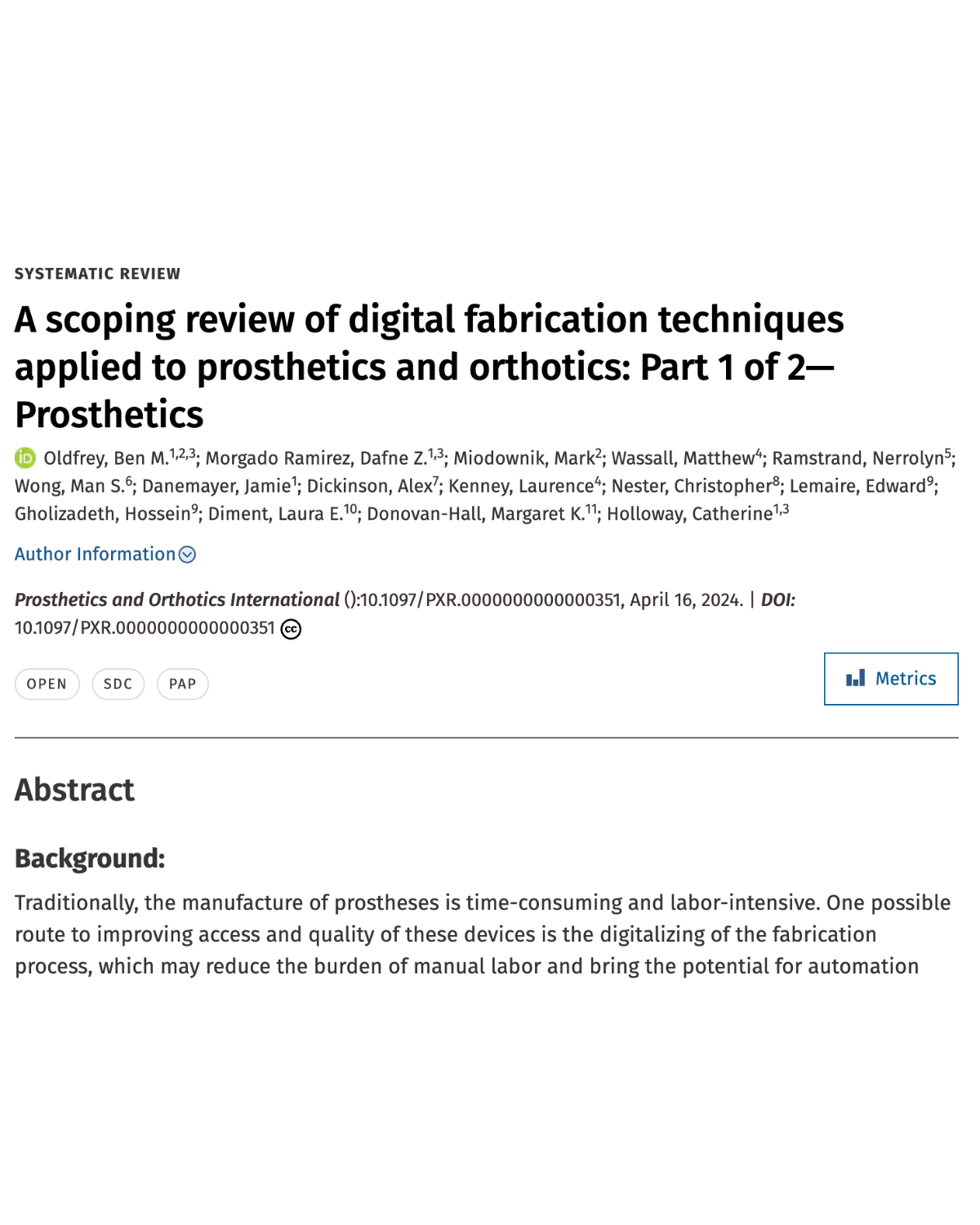
A scoping review of digital fabrication techniques applied to prosthetics and orthotics: Part 1 of 2-Prosthetics
Dr Ben Oldfrey, Dr Dafne Morgado Ramirez, Mark Miodownik, Matthew Wassall, Nerrolyn Ramstrand, Man S Wong, Jamie Danemayer, Alex Dickinson, Laurence Kenney, Christopher Nester, Edward Lemaire, Hossein Gholizadeth, Laura E Diment, Margaret K Donovan-Hall, Catherine HollowayApril 16, 2024GlobalAcademic Research PublicationsThis scoping review examines the application of digital fabrication techniques to prosthetics, aiming to address gaps in the literature that hinder the adoption of these technologies in clinical settings. Traditional prosthetic manufacturing is labor-intensive and time-consuming, but digital fabrication could streamline the process and improve global access. A comprehensive search across multiple databases yielded 3487 articles, with 247 studies on lower and upper limb prosthetics included in the review. The findings highlight significant limitations, including the need for larger, long-term studies, better understanding of training requirements, and variability in production workflows and materials, all of which impede consistent conclusions
-
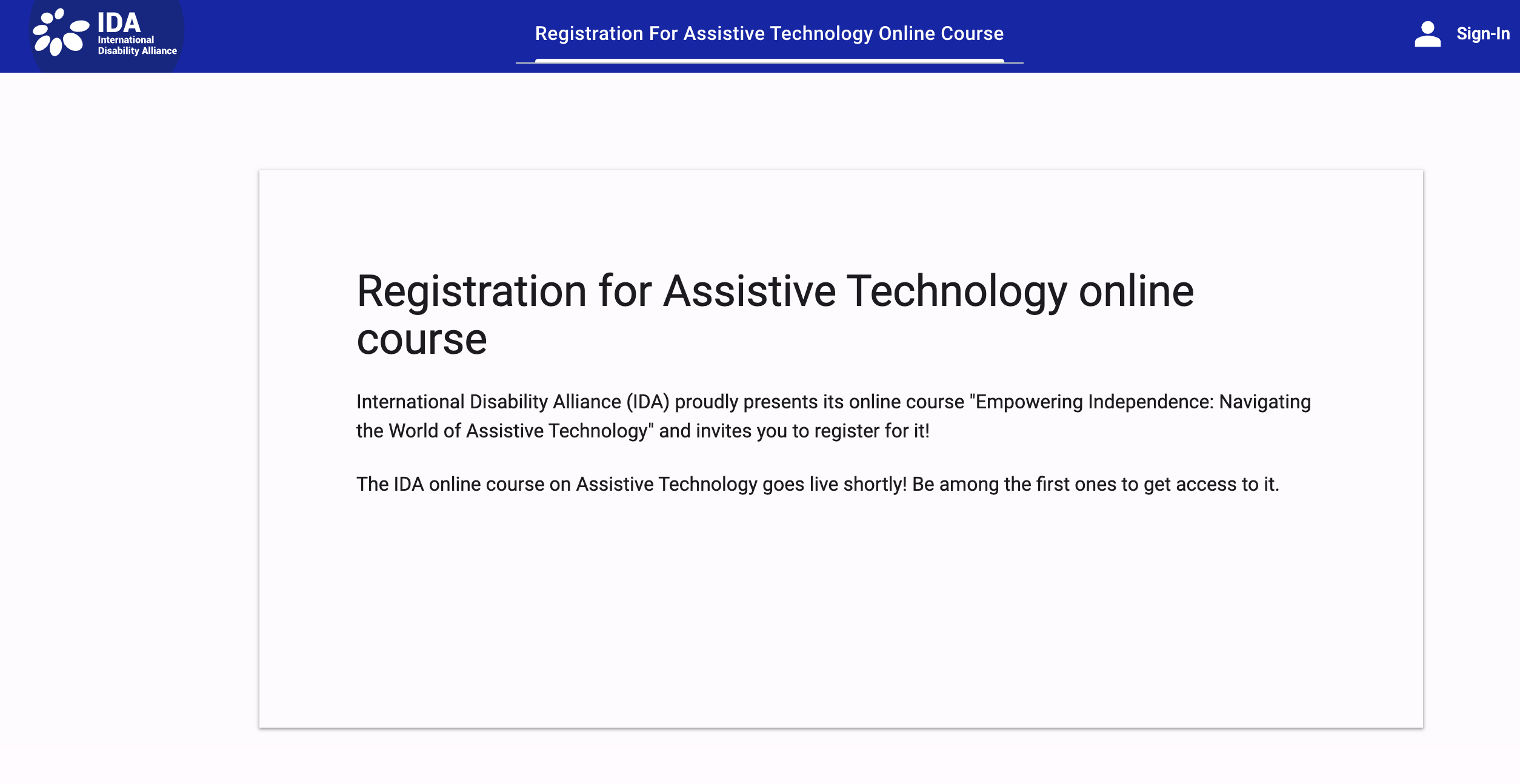
Registration for Assistive Technology online course
International Disability AllianceMarch 31, 2024GlobalAT2030 ResourcesInternational Disability Alliance (IDA) proudly presents its online course "Empowering Independence: Navigating the World of Assistive Technology" and invites you to register for it! Be among the first ones to get access to it.
-
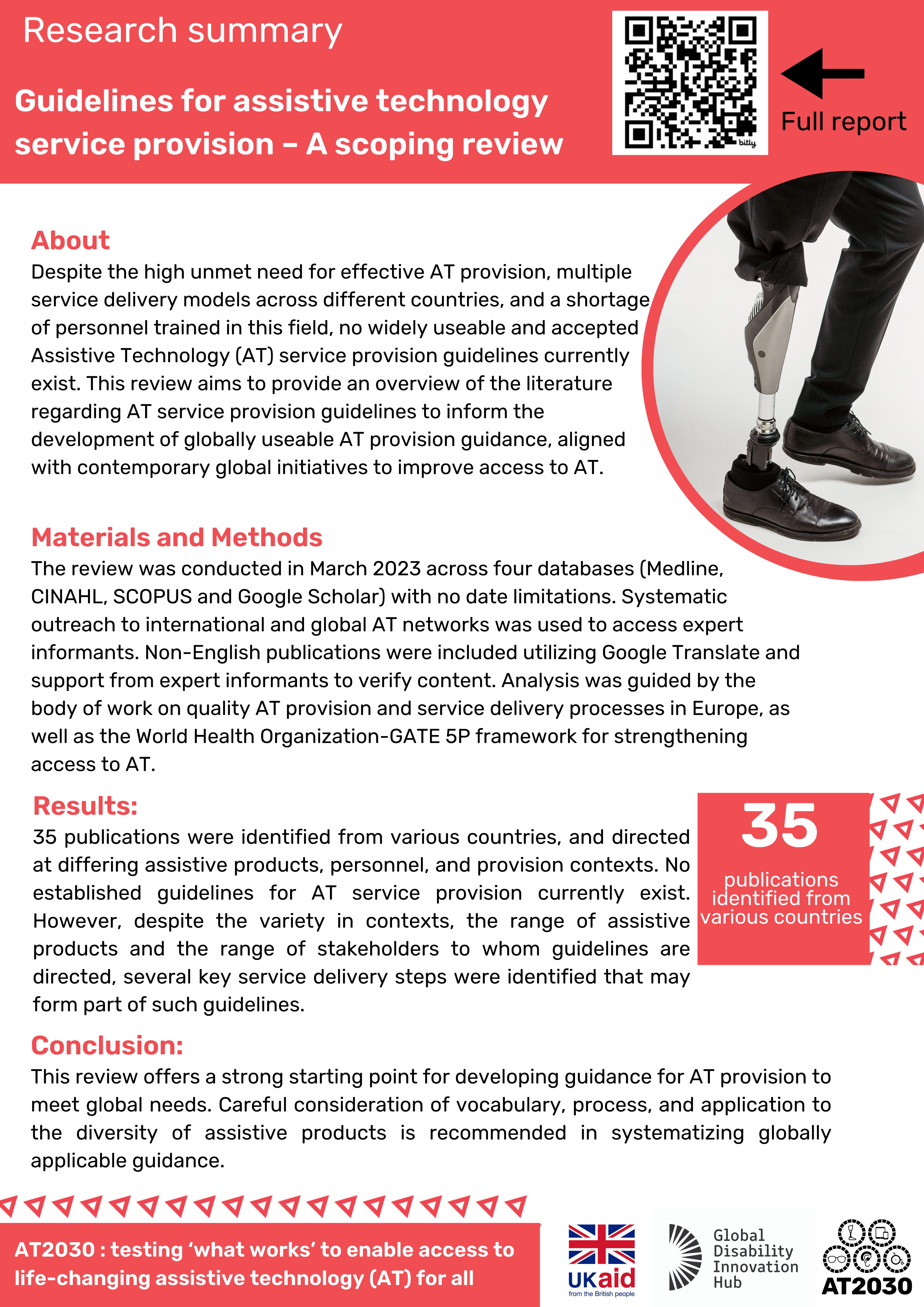
Research summary Guidelines for assistive technology service provision
Diane BellMarch 29, 2024GlobalResearch SummariesThis research summary provides key highlights and snapshot content from the guidelines for assistive technology service provision – A scoping review.
-

Situational Analysis of Manual Wheelchair Provision: Nepal
Global Disability Innovation HubMarch 29, 2024NepalAT2030 ResourcesThe Enabling Friday Community (EFC) Nepal has proposed a vision for change based on 4 working sessions over the past few months - Enabling Fridays Vision. While we want to focus on building sustainable assistive technology innovation and systems, we as a group recognised the obvious need for specific data to inform the work. Collaboratively we have agreed that a situational analysis and action plan for sustainable manual wheelchair provision should be prioritised to develop a working methodology and service system template. An initial concept note for the work can be found at the below link on which official consultation is being sought within Nepal before proceeding.
-
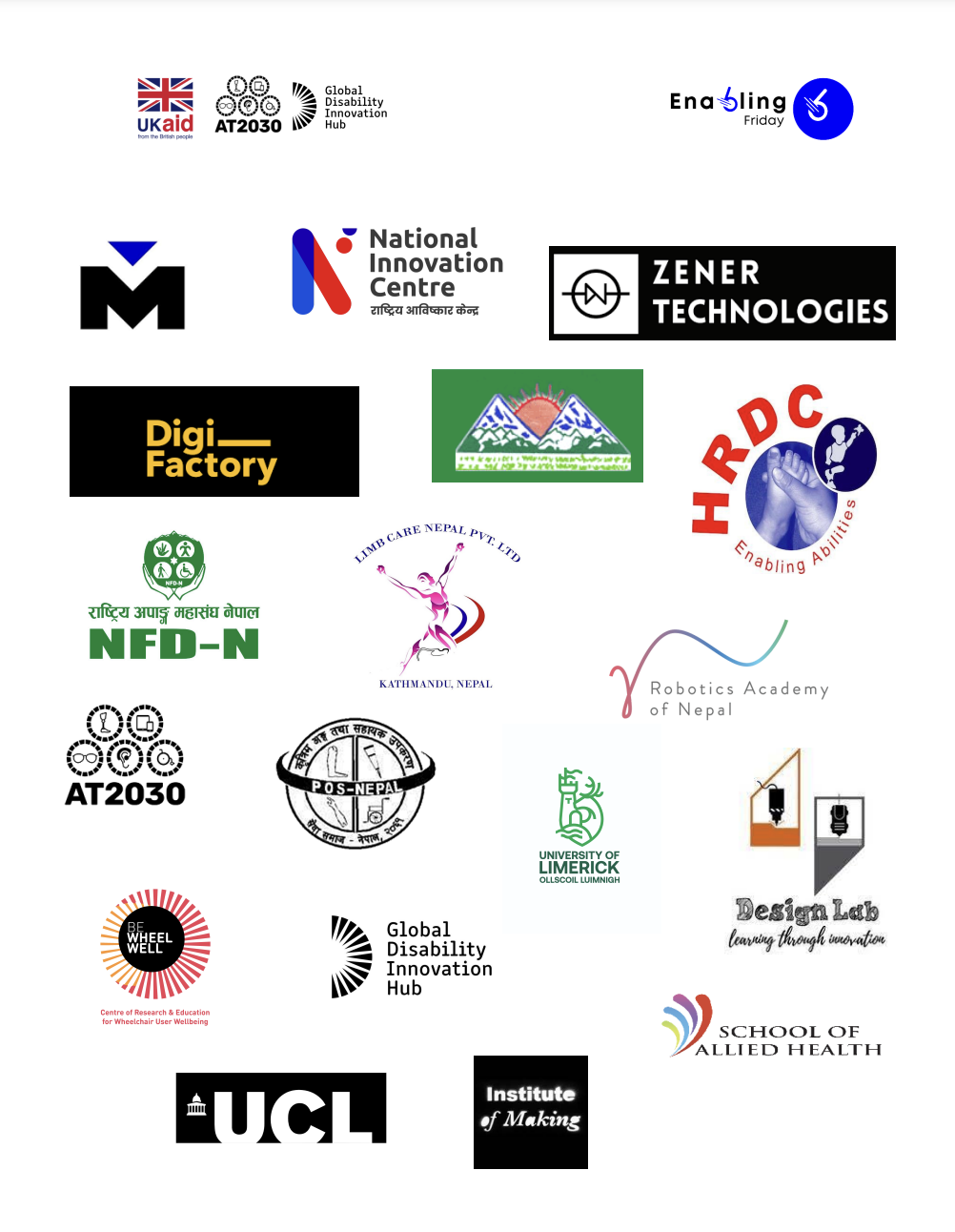
Enabling Fridays Community Nepal
Global Disability Innovation Hub, RAM CHANDRA THAPAMarch 29, 2024NepalAT2030 ResourcesWe believe that now is the time to examine where more localized product and service innovation could unlock more sustainable and resilient AT ecosystem infrastructure in Nepal. We believe there is an opportunity to create better connections between the AT community and local manufacturers, with both newer digital and traditional fabrication expertise to enable sustainable technology transfer and promote innovation. The Enabling Fridays Community Nepal want to bring together local and global expertise working in the AT sector to identify routes that would unlock local innovation, and improve current gaps in service. We have convened our initial stakeholder group over 3 sessions to collectively define problem indicators and set an agenda for what the next steps should be. The overarching challenge for AT provision in Nepal is that there is currently no visible pathway to appropriately meet people's needs throughout their lifetime.
-
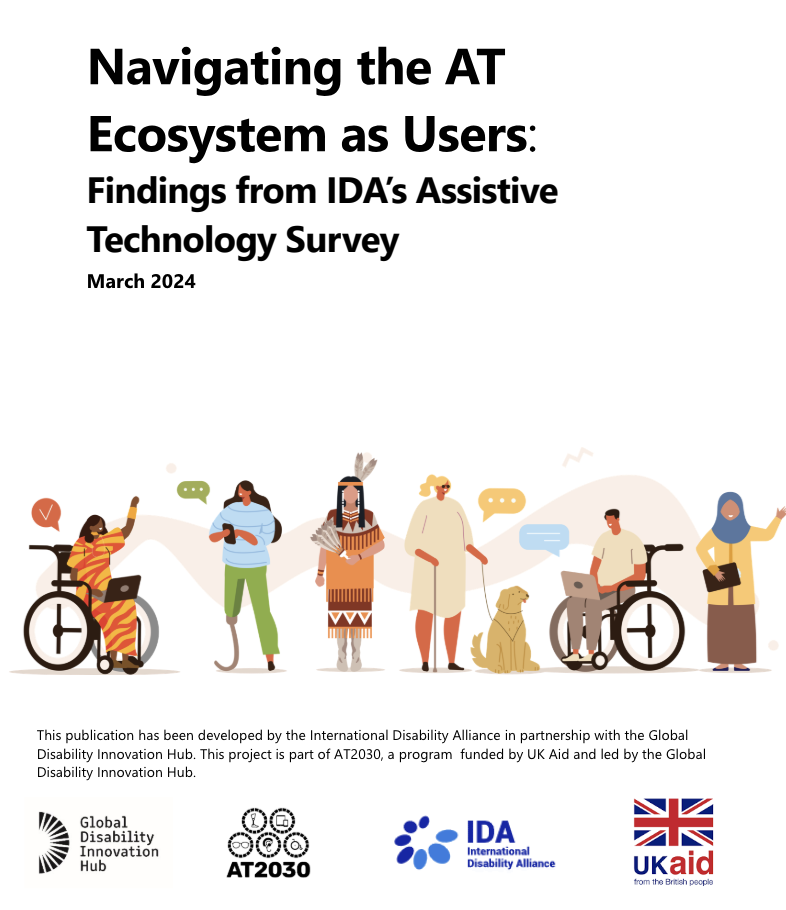
Navigating the AT Ecosystem as Users: Findings from IDA’s Assistive Technology Survey
International Disability Alliance, Global Disability Innovation HubMarch 27, 2024GlobalAT2030 ResourcesThis report is the collective work of the International Disability Alliance and GDI Hub. The survey report is under the project “Positioning OPDs as Equal Partners on AT” to provide technical support, disseminate research, and advocate for access of persons with disabilities to assistive technology in respective regions. This report, and its base survey, also benefitted greatly from the contributions of the IDA-GDI Hub AT User Fellows, namely Ahmed Abdallah, Banya Ojok, Elizabeth Campos, Nayem Molla, and Yusra Gilani. Several user testers from IDA’s community of practice supported the enhancement of this survey, with their contributions making the survey accessible to numerous respondents.
-

Paralympic Broadcasting in Sub-Saharan Africa: Sport, Media and Communication for Social Change
Harrison KamauMarch 26, 2024GlobalResearch SummariesThis research summary provides key highlights and snapshot content from the research paper, Paralympic Broadcasting in Sub-Saharan Africa: Sport, Media and Communication for Social Change.
Previous PageNext Page